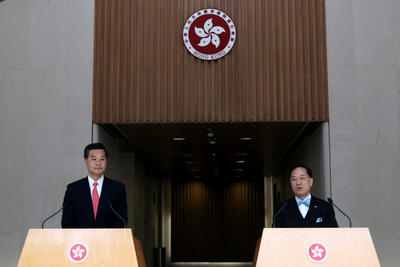For a long time it was expected that Henry Tang would win the election, as it was widely understood the former Chinese president Jiang Zemin had groomed him for the position. Tang had steadily worked his way up the ranks, moving from secretary for industry and commerce to financial secretary and finally becoming secretary for administration.
But Tang’s seemingly undisputed claim to the position of chief executive changed a few months before the election when Leung Chun-ying emerged as a serious challenger. The media reported that Chinese officials had initially persuaded Leung to abandon his candidature, but he defied the advice and showed Beijing he had more popular support than Tang.
About two or three weeks before the election, Hong Kong’s political elite received word that China’s leadership had decided to support Leung. Beijing worked hard to campaign for him, and he was able to win a majority of votes in the first ballot. Despite this, business leaders made it clear they did not trust Leung and continued to support Tang in open defiance of Beijing’s will. Leung kept his lead during the campaign and eventually won on a reform platform.
The third candidate, Albert Ho, represented the pro-democracy camp and performed relatively well in the debates, but was ignored because from the beginning he had no chance of winning the election.
The campaign was dominated by scandals and mud-slinging despite instructions from Beijing that the competition should be civil. The scandals largely discredited Tang, casting doubt over his integrity and competence in handling crises. Nevertheless, influential business tycoons sought to preserve the status quo by supporting his candidacy. Two pro-establishment figures — Regina Ip and Jasper Tsang Yok-sing — were also tempted to enter the electoral race at the height of the scandals, but both failed to obtain the Chinese authorities’ endorsement and soon abandoned their plans.
Pro-democracy groups performed unexpectedly well in the elections to the Election Committee, reflecting that middle-class professionals consider there should be more choice in the election and that pro-democracy groups deserve to have an official candidate. This development is especially significant given that, in a mock election organised by civil society groups, all three candidates proved unacceptable in the eyes of Hong Kong society. No candidate secured more than 20 per cent of the vote.
In contrast to 1997, when Britain returned Hong Kong to China, the city’s inhabitants were expecting reforms this time round. Reforms are needed to reverse the slow but steady decline of the territory’s international economic competitiveness and to improve social services, which would help contain grievances being generated by a widening gap between the rich and the poor.
The chief executive election could have been an excellent opportunity to discuss these reforms. This is because Hong Kong’s residents have not yet formed a consensus on whether the government should intervene more to promote economic development, and whether it should assume a bigger responsibility and financial burden in providing a more comprehensive social security net.
The community’s dissatisfaction with such issues reinforces its disillusionment with a political process in which general society has little say. Underscoring this disillusionment were protests outside the building where the Election Committee met on the day of the election. A further protest rally was also organised on 1 April and an impressive turnout is expected this year at the traditional demonstration for democracy held annually on 1 July.
The Leung administration is now likely to patch up relations with the business community, so it may not be as forthright with its reform agenda as originally promised. This contradiction, added to the various divisions exacerbated by the election, will undoubtedly deter some from supporting the government. Moreover, the Chinese authorities’ desire to further democratise the electoral process has also been weakened. Leung visited the Central Liaison Office (the organ of the Beijing State Council in Hong Kong) on the day after the election, reaffirming the Chinese authorities’ increased influence in the territory.
The Hong Kong community’s identification with China and trust in the central government in Beijing certainly strengthened between 1997 and around 2008. But this trend has since been reversed, and many in Hong Kong now blame the central Chinese authorities for the regional administration’s unsatisfactory performance.
Joseph Cheng is Chair Professor of Political Science at the City University of Hong Kong.

